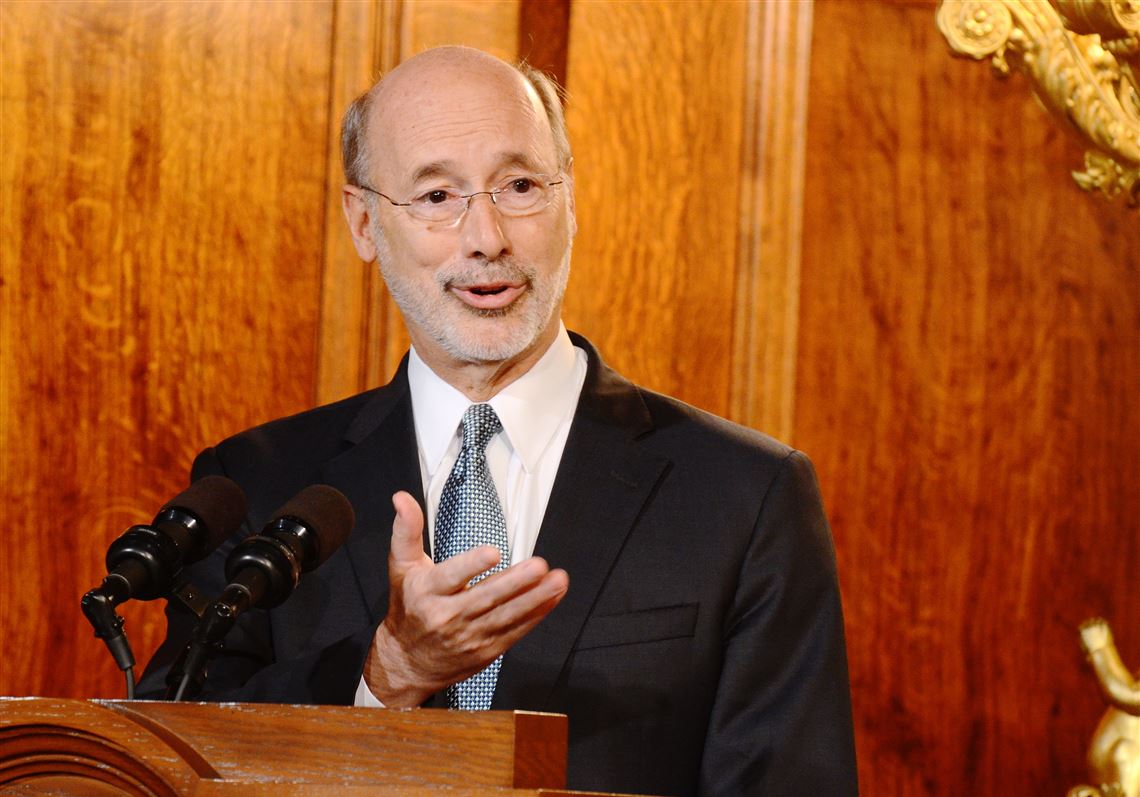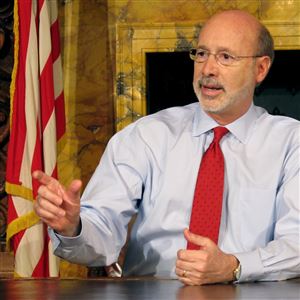HARRISBURG — In an unexpected move that immediately raised a host of legal questions, Gov. Tom Wolf said on Sunday that he will allow the $31.5 billion spending plan the Legislature has sent him to become law — even though there is no plan for how to pay for it.
The governor, a Democrat, has until 11:59 p.m. today to decide whether to sign or veto, in whole or in part, the spending plan that the Republican-controlled Legislature approved just hours before the July 1 start of the new fiscal year.
Mr. Wolf had initially said he could not back a budget without a corresponding deal on revenues to support it. But he told reporters on Sunday that he will allow the negotiated spending plan to lapse into law without his signature — even if there is no agreement on how to pay for it — because he believes the Legislature will swiftly deliver a revenue plan.
His decision had everyone from legislators to lobbyists scurrying to find their copy of the Pennsylvania Constitution.
State law requires that the budget be balanced. Without a revenue plan, the $31.5 billion blueprint the Legislature sent Mr. Wolf will not be in balance, as it needs new revenue to prop it up.
Asked about that requirement, Mr. Wolf said he was confident the Legislature will deliver a compromise by today.
“I believe this can, I believe it should be done, by the end of the day tomorrow,” he said Sunday.
It is a leap of faith for the governor.
Last year’s negotiations became mired in a stubborn and politically bruising impasse that lasted for nine months, until Mr. Wolf allowed the budget to become law without his signature. He withheld his signature as a sign of protest.
This time, he intends to forgo signing the plan as a signal that he believes a new “spirit” of bipartisanship in the Capitol will lead to a swift resolution.
“I think there is a different spirit,” Mr. Wolf said, noting that he and Republicans have been able to meet eye to eye over the last six months on difficult pieces of legislation, including legalizing medical marijuana and making changes to the state-run liquor system. “… I’m trying to encourage that we continue with that good spirit as we get through the last hours of this budget process.”
Still, he would not say what he might do should the Legislature not deliver.
His top aides said he will not spend more than what the state is bringing in, leaving open the possibility that Mr. Wolf would have to make cuts. They would not say which programs might be affected, or when. But under that scenario, Mr. Wolf, rather than the Legislature, would be the one making the decisions.
In defending Mr. Wolf’s announcement Sunday, administration officials said their interpretation of state law is that it is the Legislature’s duty to ensure there is enough money to support spending.
They also said the constitution leaves ample legal room for Mr. Wolf to allow a spending plan to become law without his signature.
Still, no one could remember a time when the state had not met the constitutional demand for a balanced budget.
“This is a new frontier,” said Drew Crompton, the Senate’s top Republican lawyer.
Rep. Mike Vereb, R-Montgomery, put it this way: “Nothing is normal up here. This is the new normal.”
Although the Legislature met the July 1 deadline for sending Mr. Wolf a budget this year, it did not send him a corresponding plan for how to pay for it.
Since that time, House and Senate leaders have been negotiating to find new sources of revenue to meet the governor’s demand that they close the deficit and boost funding for public education.
The House has backed a revenue package that would raise about $1 billion from expanding gambling, hiking tobacco taxes, breaking the state’s monopoly on wine sales and instituting a tax amnesty program.
Mr. Wolf and top Senate Republicans have questioned the House’s plans, saying they rely on unrealistic projections. Senate leaders have also expressed misgivings about the House’s proposal to increase by $1 the tax on a pack of cigarettes, as well as the scope of its gambling expansion measure, which calls for legalizing online gambling and placing slots in airports and off-track betting parlors.
And in a surprising twist, negotiators have revived discussions on a pension reform bill.
House Majority Leader Dave Reed, R-Indiana, told reporters Sunday that there have been talks behind the scenes about resurrecting a pension reform bill that calls for future state and public school employees to receive a 401(k)-style plan, as well as a less generous version of the traditional retirement benefit that current employees also received.
Pension changes were a key sticking point during last year’s historic budget impasse. But the issue has been front and center for Senate Republicans, who have said repeatedly that they believe the state cannot begin to address its fiscal problems without tackling the problem of its skyrocketing pension costs.
Angela Couloumbis: acouloumbis@phillynews.com, 717-787-5934 or @AngelasInk
First Published: July 11, 2016, 4:00 a.m.
Updated: July 11, 2016, 4:16 a.m.


















